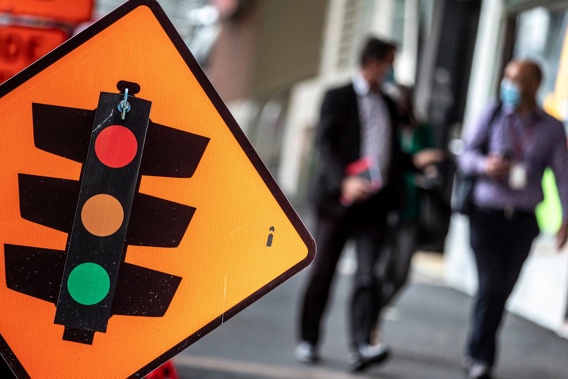
Two top epidemiologists say it's time for the Government to replace our "highly inefficient" Covid-19 traffic lights with a smarter, lasting system the country could use to tackle all viruses.
Our Covid-19 Protection Framework came under renewed focus ahead of the pre-Easter jump to orange, with National leader Christopher Luxon calling for the three-tier system to be scrapped in place of a smaller number of "simple" rules.
Last month, the Government moved to simplify the system by ending most vaccine mandates and scanning requirements, along with removing outdoor capacity limits and mask rules, while doubling capacity limits at indoor venues like bars and restaurants at red.
Beyond that, a spokesperson for Covid-19 Response Minister Chris Hipkins said there weren't any immediate plans to make further changes.
But experts argue the country needs a stronger system that it could stick to.
"It's highly inefficient and very confusing for everyone if New Zealand has to keep changing frameworks each time the pandemic turns a new corner," Otago University epidemiologist Dr Amanda Kvalsvig said.
"It's time to be proactive rather than reactive."
She saw the best option as a "next generation" alert level system that would look much different to the one rolled out two years ago.
"Instead of having an entire alert level system built around one virus, we need a system that's ready for a variety of infectious disease threats, ranging from familiar infections like seasonal flu to emergence of a new and completely unfamiliar pandemic disease."

"It's time to be proactive rather than reactive," Otago University epidemiologist Dr Amanda Kvalsvig says. Photo / Supplied
Fellow Otago University epidemiologist Professor Michael Baker said a new system would have to be simple but stable enough to meet future threats – and could potentially come with five levels, ranging from more restrictive measures when there was "maximum danger", to few when there was none.
"If we think about it in traffic light terms, most of the action would be in the orange zone, which would have sufficient levels that it could cope with a spectrum ranging from a very severe influenza epidemic, right up to managing different levels of Covid-19 controls, but short of stay-at-home orders."
While vaccine mandates had helped New Zealand's response, Baker felt such measures shouldn't be integrated in alert level settings, and instead be separated out.
Kvalsvig said that, if the country was headed into a bad flu season, masks might be temporarily required in certain settings where flu spread easily.
Highly disruptive measures like circuit-breaking lockdowns would only be used for severe public health emergencies.
"In normal times, a well-designed alert level system would work quietly in the background, dampening down outbreaks before the public is even aware of them."
She added that social support measures could also be woven through the levels, so that assistance could be stepped up if they changed.
"For example, paid sick leave is a vital public health protection at all times: all workers need to be able to stay home when they're infectious, without worrying about losing their job or not being able to eat," she said.
"In a major public health emergency where people might be asked to shelter in place, further support needs to kick in to ensure that everyone has a safe place to live, enough food for the household, access to healthcare, and income for necessities.
"New Zealand's ability to weather a serious infectious disease threat will depend as much on this type of community resilience as on the more technical aspects of infection control."
Kvalsvig and colleagues proposed such a system to the Ministry of Health early last year, but there was little appetite for change at the time.
"But the confusingly mixed messages that the Covid Protection Framework seems to generate and its unsuitability in the face of the Omicron outbreak have shown very clearly that we need a new system," she said.
Baker added that, unlike immunity from vaccines, the power of a well-designed system to protect public health wouldn't wane.
"I think we've now got enough knowledge and experience to do this very well."
With case numbers trending back downward nationally, Baker saw now as an ideal time for a review.
Today, the Ministry of Health reported another 6242 new community cases of Covid-19, along with 11 virus-linked deaths and 553 patients in hospital.
- by Jamie Morton, NZ Herald
Take your Radio, Podcasts and Music with you









